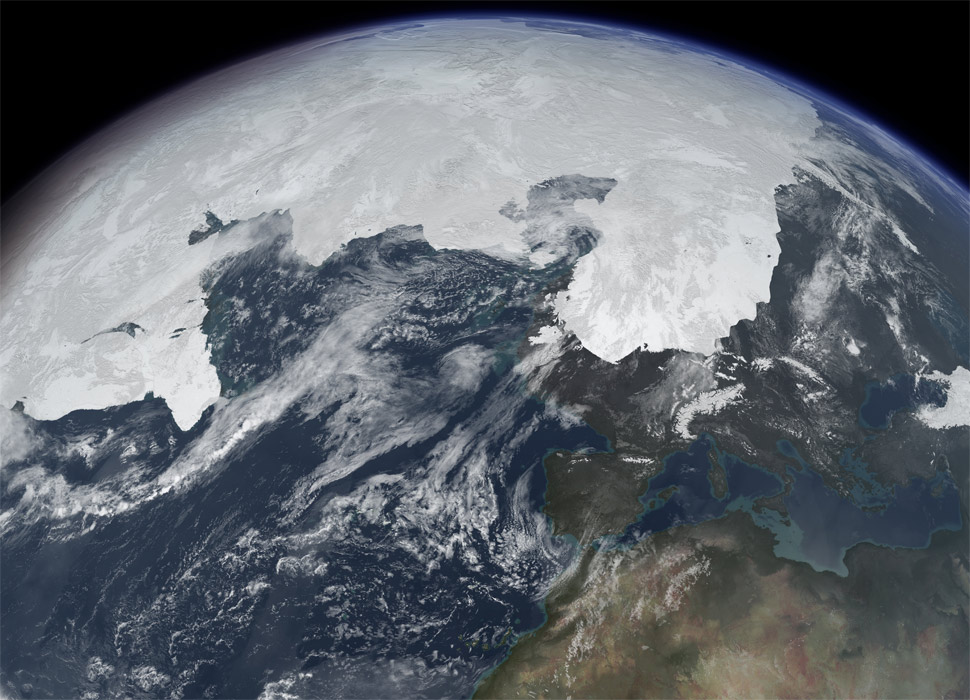
18th January 2016 Next ice age delayed by 100,000 years Man-made carbon emissions have delayed the next ice age by as much as 100,000 years, according to researchers at the Potsdam Institute for Climate Impact Research.
Humanity has become a geological force that is able to suppress the beginning of the next ice age, according to a new study published in Nature. Scientists at the Potsdam Institute for Climate Impact Research in Germany found the relation of insolation (solar radiation hitting the Earth's surface) and CO2 concentration in the atmosphere are the key criterion to explain the last eight glacial cycles in Earth's history. At the same time, their results show that even moderate human interference with the planet's natural carbon balance might postpone the next glacial inception by 100,000 years. Even without man-made climate change, the current geological cycle (known as the Holocene) suggests that the earliest the next ice age could be expected to arrive is 50,000 years from now. However, the addition of man-made CO2 from human activity since the Industrial Revolution is already sufficient to postpone the next ice age by a further 50,000 years, while future anthropogenic emissions in the coming decades may increase that by yet another 50,000 years. "The bottom line is that we're basically skipping a whole glacial cycle, which is unprecedented," says lead author Andrey Ganopolski. "It's mind-boggling that humankind is able to interfere with a mechanism that shaped the world as we know it." For the first time, says Ganopolski, scientists can explain the onset of the past eight ice ages by quantifying several key factors that preceded the formation of each glacial cycle: "Our results indicate a unique functional relationship between the summer insolation and atmospheric CO2 for the beginning of a large-scale ice-sheet growth which does not only explain the past, but also enables us to anticipate future periods when glacial inception might occur again." Using an elaborate Earth system model – simulating atmosphere, ocean, ice sheets and global carbon cycle at the same time – the scientists analysed the effects of further human-made CO2-emissions on the ice volume in the Northern Hemisphere. "Due to the extremely long life-time of anthropogenic CO2 in the atmosphere, past and future emissions have a significant impact on the timing of the next glacial inception," says co-author Ricarda Winkelmann. "Our analysis shows that even small additional carbon emissions will most likely affect the evolution of the Northern Hemisphere ice sheets over tens of thousands of years, and moderate future anthropogenic CO2-emissions of 1000 to 1500 Gigatons of Carbon are bound to postpone the next ice age by at least 100,000 years." The search for what drives each glacial cycle remains one of the most fascinating questions of Earth system analysis, and especially paleoclimatology – the study of climate changes throughout the entire history of our planet. Usually, the beginning of a new ice age is marked by periods of very low solar radiation in summer, like current times. However, at present there is no evidence for a new ice age emerging: "This is the motivation for our study. Unravelling the mystery of the mechanisms driving past glacial cycles also facilitates our ability to predict the next glacial inception," Winkelmann says. "Like no other force on the planet, ice ages have shaped the global environment and thereby determined the development of human civilisation. For instance, we owe our fertile soil to the last ice age that also carved out today's landscapes, leaving glaciers and rivers behind, forming fjords, moraines and lakes. However, today it is humankind with its emissions from burning fossil fuels that determines the future development of the planet," co-author and PIK-Director Hans Joachim Schellnhuber says. "This illustrates very clearly that we have long entered a new era, and that in the Anthropocene humanity itself has become a geological force. In fact, an epoch could be ushered in which might be dubbed the Deglacial."
Comments »
|







